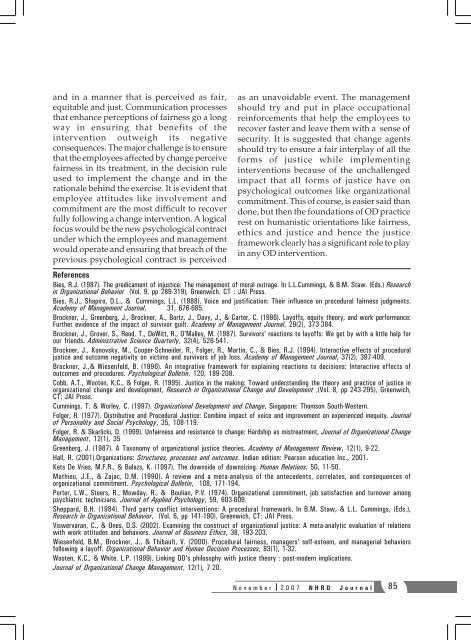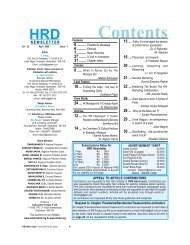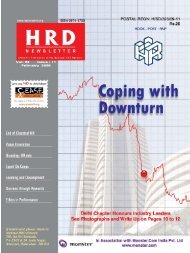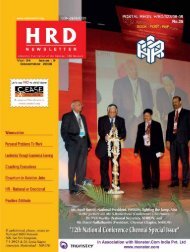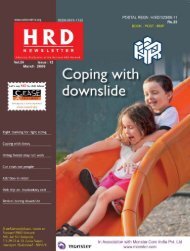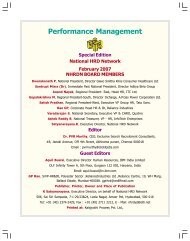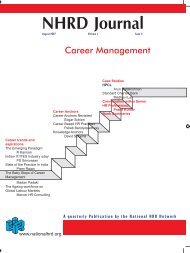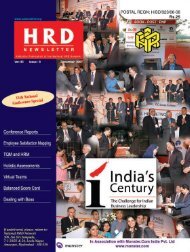NHRD Journal - National HRD Network
NHRD Journal - National HRD Network
NHRD Journal - National HRD Network
Create successful ePaper yourself
Turn your PDF publications into a flip-book with our unique Google optimized e-Paper software.
and in a manner that is perceived as fair,<br />
equitable and just. Communication processes<br />
that enhance perceptions of fairness go a long<br />
way in ensuring that benefits of the<br />
intervention outweigh its negative<br />
consequences. The major challenge is to ensure<br />
that the employees affected by change perceive<br />
fairness in its treatment, in the decision rule<br />
used to implement the change and in the<br />
rationale behind the exercise. It is evident that<br />
employee attitudes like involvement and<br />
commitment are the most difficult to recover<br />
fully following a change intervention. A logical<br />
focus would be the new psychological contract<br />
under which the employees and management<br />
would operate and ensuring that breach of the<br />
previous psychological contract is perceived<br />
as an unavoidable event. The management<br />
should try and put in place occupational<br />
reinforcements that help the employees to<br />
recover faster and leave them with a sense of<br />
security. It is suggested that change agents<br />
should try to ensure a fair interplay of all the<br />
forms of justice while implementing<br />
interventions because of the unchallenged<br />
impact that all forms of justice have on<br />
psychological outcomes like organizational<br />
commitment. This of course, is easier said than<br />
done, but then the foundations of OD practice<br />
rest on humanistic orientations like fairness,<br />
ethics and justice and hence the justice<br />
framework clearly has a significant role to play<br />
in any OD intervention.<br />
References<br />
Bies, R.J. (1987). The predicament of injustice: The management of moral outrage. In L.L.Cummings, & B.M. Staw. (Eds.) Research<br />
in Organizational Behavior (Vol. 9, pp 289-319), Greenwich. CT : JAI Press.<br />
Bies, R.J., Shapiro, D.L., & Cummings, L.L. (1988). Voice and justification: Their influence on procedural fairness judgments.<br />
Academy of Management <strong>Journal</strong>, 31, 676-685.<br />
Brockner, J., Greenberg, J., Brockner, A., Bortz, J., Davy, J., & Carter, C. (1986). Layoffs, equity theory, and work performance:<br />
Further evidence of the impact of survivor guilt. Academy of Management <strong>Journal</strong>, 29(2), 373-384.<br />
Brockner, J., Grover, S., Reed, T., DeWitt, R., O'Malley, M. (1987). Survivors' reactions to layoffs: We get by with a little help for<br />
our friends. Administrative Science Quarterly, 32(4), 526-541.<br />
Brockner, J., Konovsky, M., Cooper-Schneider, R., Folger, R., Martin, C., & Bies, R.J. (1994). Interactive effects of procedural<br />
justice and outcome negativity on victims and survivors of job loss. Academy of Management <strong>Journal</strong>, 37(2), 397-409.<br />
Brockner, J.,& Wiesenfeld, B. (1996). An integrative framework for explaining reactions to decisions: Interactive effects of<br />
outcomes and procedures. Psychological Bulletin, 120, 189-208.<br />
Cobb, A.T., Wooten, K.C., & Folger, R. (1995). Justice in the making: Toward understanding the theory and practice of justice in<br />
organizational change and development, Research in Organizational Change and Development ,(Vol. 8, pp 243-295), Greenwich,<br />
CT: JAI Press.<br />
Cummings, T. & Worley, C. (1997). Organizational Development and Change, Singapore: Thomson South-Western.<br />
Folger, R. (1977). Distributive and Procedural Justice: Combine impact of voice and improvement on experienced inequity. <strong>Journal</strong><br />
of Personality and Social Psychology, 35, 108-119.<br />
Folger, R. & Skarlicki, D. (1999). Unfairness and resistance to change: Hardship as mistreatment, <strong>Journal</strong> of Organizational Change<br />
Management, 12(1), 35<br />
Greenberg, J. (1987). A Taxonomy of organizational justice theories. Academy of Management Review, 12(1), 9-22.<br />
Hall, R. (2001).Organizations: Structures, processes and outcomes. Indian edition: Pearson education Inc., 2001.<br />
Kets De Vries, M.F.R., & Balazs, K. (1997). The downside of downsizing. Human Relations, 50, 11-50.<br />
Mathieu, J.E., & Zajac, D.M. (1990). A review and a meta-analysis of the antecedents, correlates, and consequences of<br />
organizational commitment. Psychological Bulletin, 108, 171-194.<br />
Porter, L.W., Steers, R., Mowday, R., & Boulian, P.V. (1974). Organizational commitment, job satisfaction and turnover among<br />
psychiatric technicians. <strong>Journal</strong> of Applied Psychology, 59, 603-609.<br />
Sheppard, B.H. (1984). Third party conflict interventions: A procedural framework. In B.M. Staw, & L.L. Cummings, (Eds.),<br />
Research in Organizational Behavior, (Vol. 6, pp 141-190), Greenwich, CT: JAI Press.<br />
Viswervaran, C., & Ones, D.S. (2002). Examining the construct of organizational justice: A meta-analytic evaluation of relations<br />
with work attitudes and behaviors. <strong>Journal</strong> of Business Ethics, 38, 193-203.<br />
Wiesenfeld, B.M., Brockner, J., & Thibault, V. (2000). Procedural fairness, managers' self-esteem, and managerial behaviors<br />
following a layoff. Organizational Behavior and Human Decision Processes, 83(1), 1-32.<br />
Wooten, K.C., & White. L.P. (1999). Linking OD's philosophy with justice theory : post-modern implications.<br />
<strong>Journal</strong> of Organizational Change Management, 12(1), 7-20.<br />
November 2007 <strong>N<strong>HRD</strong></strong> <strong>Journal</strong> 85


